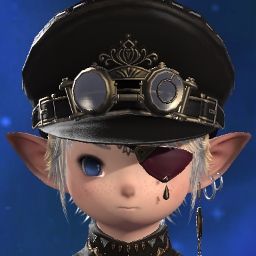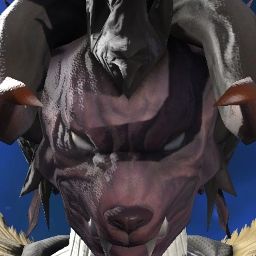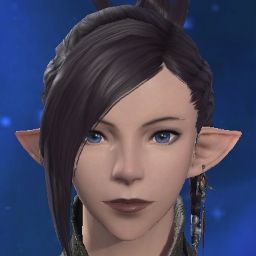Before my sub runs out i need to ask a question that is bothering me, about new beast tribe.
Doing the new beast tribe quests, we see two peoples from worlds that have ended. The "humans in armor" and the "otter people in diving suits". Weren't these two people supposed to be extinct?
I have to say that I'm not a native English speaker, so maybe I missed something.
-
10-29-2022 01:46 AM #7221Player

- Join Date
- Mar 2019
- Location
- between the good and bad is where you will find me
- Posts
- 624
- Character
- Cyric Eladriel
- World
- Behemoth
- Main Class
- Blue Mage Lv 80
-
10-29-2022 05:47 AM #7222
I think they explained it with them being complete reconstructions based on what was found in the Dead Ends. The entirety of Ultima Thule is this as well. I'm not going to go too far into it because I stopped caring when Yoshi thought Coincounter needed danger zones. Also as these are the same people that created Omega, it's really not that far off that they're capable of recreating life.................wish they would stop though as the worm can that will open is bottomless.
(2)
-
10-29-2022 08:41 AM #7223
-
10-29-2022 08:42 AM #7224
Man, lucky people. Must be nice to be able to unsub. I'm still stuck with half-assed slaving away in HC1 prog. Once I finish up the next ultimate, I think it's time to put my WoL to rest. Everything's too sanitized and sterile to be fun anymore. I got other MMOs that have hooked me far deeper than 14 has anyways.
Theodric and co. were great fun to read on here. Gonna be sad to see 'em go. Was a great reason to pull up the OF and were one of the few people on here that still have some sanity when it comes this game. o7(9)
-
10-29-2022 10:13 AM #7225Player

- Join Date
- Apr 2020
- Location
- Amaurot
- Posts
- 1,128
- Character
- Marel Nobelle
- World
- Midgardsormr
- Main Class
- Dark Knight Lv 100
When I say that Graeham is our national treasure, I don't mean that he's funny, for he is no laughing matter. Graeham is the ideal that the posters of the forum aspire to be. We've had many who have tried to follow in his footsteps. Deveryn, Atelier, VelKallor, Silverbane, and many more. They have come close, but all have failed. None can match the perfection that is Graeham. He is truly our role model in every way.
(4)Last edited by AwesomeJr44; 10-29-2022 at 10:16 AM.
-
10-30-2022 10:22 PM #7226
Post history. They also stated they were "trying" when someone commended them on their broken English trolling in a now deleted thread.
I don't post very often but I do read what's going on on the forums since I have nothing better to do at work and it's more entertaining than reddit.
I've been doing the newest beast tribes and got a late start on them because I was not enthused to start. I don't know how they gave the robots more personality than most of the scions, but they did it. Positives: Minimal amount of rabbit, robot dialogue is good and pretty funny. Negative: Still a coin flip if they adhere to the "themes" of endwalker...
Forge ahead? No, no, give them what they want, reward them
People in robes and masks bad? Yes, always(6)
-
10-31-2022 11:56 AM #7227Player

- Join Date
- Jul 2015
- Posts
- 1,259
- Character
- Ashe Sinclair
- World
- Phoenix
- Main Class
- Thaumaturge Lv 60
Seeing as the thread is rather listless at the moment and I have my sub back (Pandaemonium is doing some tremendous heavy-lifting when it comes to my interest in the game lately), I thought I'd share something that I've been wondering on and off since finishing EW: did they perhaps shelve a chunk of planned Garlemald content because it would reflect poorly on Emet's character, and after his popularity and the sudden upswing in player numbers during ShB, they chose to play it safe and cater to fanservice than paint him in his original darker shades of grey, thus potentially threatening a large part of what contributed to their success in the first place?
It seems to me there was more in the works prior to Garlemald's fall; the power plays for the throne, the civil war, Fandaniel's comments concerning Zenos' memories and that Emet-Selch might be behind them - which I dare to stretch to hinting at experimentation, along with the cloning - and regardless of how you may choose to look at it, any relatively lore-rich Garlemald content wouldn't have exactly cast him in the best light. However you may want to spin his reasons, his changes of heart, his soft spots, he created and used that empire for his own ends, manipulating an entire race of people by preying upon their vulnerability and latent desire for power and revenge into committing terrible atrocities against other nations, and ultimately, even if somewhat indirectly, set them up for the collapse of their society one way or another. I was actually surprised how light of a wrist tapping he gets during the Garlemald portion for this - the most noteworthy reference to him being in a sightseeing log entry - and there was a part of me that, as fond of him as I am, found his moral whitewashing in EW to be a bit disconcerting. His complexity was part of his appeal as a character, but the curious motives and emotional turmoil behind the flippant facade wound up stripped down into a grumpy heroic tsundere stereotype. I don't regret seeing Ancient Emet, and I won't deny I enjoyed him, but I wish his character had retained some of the depth, mystery and inscrutability that had made his original appearance so memorable. His moody affectation felt almost a little like lazy writing at times.
To see darker sides of Emet's character against the Garlean backdrop alongside his brighter portrayal pre-Sundering would have been interesting, but perhaps they feared the fans wouldn't think so? Or mayhap it simply boils down to what many of us have been griping about all along when it comes to Endwalker, and Emet was one casualty amongst many in oversimplifying the story and its characters to achieve their desired sugarcoated ending and inspirational message. Thoughts?(9)
-
10-31-2022 01:52 PM #7228Player

- Join Date
- Oct 2017
- Location
- Bozja
- Posts
- 2,580
- Character
- Harun Asubra
- World
- Zodiark
- Main Class
- Warrior Lv 100
If, if, that were the case. In this hypothetical scenario. And assuming your assessment of Emet Selch is correct. If I were reading a book with a character nuanced because of reasons like those, this is what I as a reader would think of them: I would say the writers are insecure
Because they're relying really hard on what gave them good publicity and made Emet Selch a memorable character. And I say "memorable character" rather than "good villain" because, to me, they're separate concepts and separate identities of Emet Selch. The Good Villain is the guy we had in early Shadowbringers: completely uncaring about whether we lived or died, affable toward us and manipulative. Someone whose backstory was tragic, but his motivations didn't justify the means, simply made him jump off the slippery slope. Rather than the villain being a stereotypical evil man, this guy was once a good guy. Or at least someone we would have befriended. He just had a really rough time, and because of that, he basically set aside any pretense and care. He views whatever remains as meaningless, and while he doesn't relish on it, views the suffering he inflicts as a necessary evil. One that, because he views the lives of the suffering as meaningless, has zero bearing on his moral compass as far as he can see.
The memorable character was that of a bitter old man who wanted nothing more than to chill and be respected among his peers. A no-nonsense serious face whose conversion to evil was simply because he was in the bad guy club. As in, "I'm in the bad guy club, I need to do bad things, but just because I'm bad guy doesn't mean I'm bad guy".
HOWEVER. at the end of Ultima Thule, he reiterates that he'd do it all over again. That he isn't remorseful of all the bad crap he got. But that's one line out of all the rest of his portrayal, meant clearly to "redeem" him and pass him off as someone respectable. It's all framed like he's a good guy deep down, even when the content of what he says is "I literally would nuke you guys right now if I could, but I can't so go on". He's always portrayed as someone who is fair and cordial to his enemies, though. Hence why even when he loses and admits his motivations are evil, he still sees your goal as being something you earned from him. So one could make the argument that they just explored him being fair even when he's an antagonist. The issue I take with this is that the game considers him to be redeemed, which... sure, it's what most fans feel, but it kind of ignores the consequences of what he did. We would not do this in real life.
And by pandering to this, it makes it look like the writers are insecure about having written a character people enjoy despite being evil. That they realized the hole they dug by making him likeable, and in capitalizing on why he's so likeable casually excuse the crap he's done.
Another way of showing insecurity is shirking responsability for what they've established. For whatever reason, be it because fans love the character and you want to give them a brighter outlook, or because of real-life biases and opinions of the author, they just didn't believe it necessary to harp on all the crap that's been shown with him as the origin point. For expansions we've been consistently told that Garlemald's expansionistic motivations stem from Emet's lies and nationalistic rethoric. We've seen the effects of Garlean hate and might through Ala Mhigo, Doma, Bozja and Werylt. And we know that the height of the Allagan empire came due to his machinations, as did the establishment of Eulmore as a power nation of decadence. It wasn't just "Oh I cutely blew up a world and nearly blew up this one for my God" like the story likes to present it. No, to lead those worlds into such a direction, he motivated a lot of torture, death and pain for people and didn't bat a single eye. For whatever reason, the devs insist on excusing those "smaller" but more realistic issues (nationalism, dictatorships and abuse of power are real-life threats, not dimensional merging...) in favour of the more fantastic sins. Because the other stuff is far too "real" and they thus feel insecure in writing these things, either because they don't know how to approach it or don't feel comfortable exploring them, and thus don't tend to focus on those things.
Now, these are criticisms of the way Emet is written, sure, but I'm saying it right now. This is hypothetical. I do see some of these as potential reasons why Emet is written the way he is, but a) I'm not thinking of every single interaction with Hades from start to finish, just his overall path and how it made me feel, which isn't enough to say whether that's what happened or not, b) this is again assuming I knew that that's what happened. That the authors really did beat around the bush with Emet past Shadowbringers and cast him in a better light. But there's no way for me to know, so I'm only relying on observations and purposely approaching them from that angle. My only observations are that Emet IS cast in a much more benevolent light in EW and they DO focus more on the fantastical crimes than the more realistic crimes. But as he does at least mention that he doesn't regret his antagonistic side and some more I might have missed, so I can't say for certain that's actually happening. Much less that that is the road they took.
What do you guys think of Emet's portrayal? And if it did indeed shift, why do you guys think it did?(3)
-
10-31-2022 02:25 PM #7229
I think the writer being insecure is pretty spot on. It was so apparent in EW, but now that I lost my nostalgia goggles, I noticed that it has been that way since HW. They're so afraid of killing beloved characters (the final one is haucherfant). They always kill or sidelines characters that aren't as popular, like papalymo, minfilia, lyse, arenvald. And ever since shb, the writers have double down on their insecurity and prioritizing fanservice. Like in 5.3 when they decided to not kill the exarch because the fans love him. And then we get the biggest insecurity in the form of Venat. A character whose crime is so whitewashed nobody called her out..
Now regarding emet and EW... Even though I love him, I do agree that the game tried to "soften" him a bit too much. However, I'm not sure I agree with garlemald section getting shelved due to emet. Not because I don't think emet didn't make the suffer in the long run, but more because I expected EW to flesh out garlean civilian/non military stuff, and perhaps set up their next leader who will be able to save garlemald from their tragic situation.
@midare, honestly that single line from emet is kinda weird. He talk much about agreeing with venat etc, but then on the next scene he said his ideal is invincible. It's strange to me because his ideal is the opposite of venat, you can't have him agree with venat but then said that line, because it's contradicting.
At least that's what my view.(9)
-
10-31-2022 03:32 PM #7230
If I may I had always suspected Garlemald was the cut expansion premise (we know the original idea was to have the story conclude in 7.0, not 6.0) due to Stormblood being the black sheep of the family and how much a Garlemald expansion would be banking on stuff from that expansion's lore. I get the feeling after ShB they felt another Stormblood style war story would have killed the pacing. There could have additionally been some push to veer away from a war storyline due to real world events at that time.
Overall I feel EW was and still is a terribly paced mess of incomplete ideals when factoring in what came before it. I surely hope this expansion is just like this due to late changes and the next expansion is a bit more fleshed out. I admit my subscription at this point is to get an adorable space jellyfish and just in case auto demolition comes back as I have my own house and an FC house to save.(5)





 Reply With Quote
Reply With Quote












